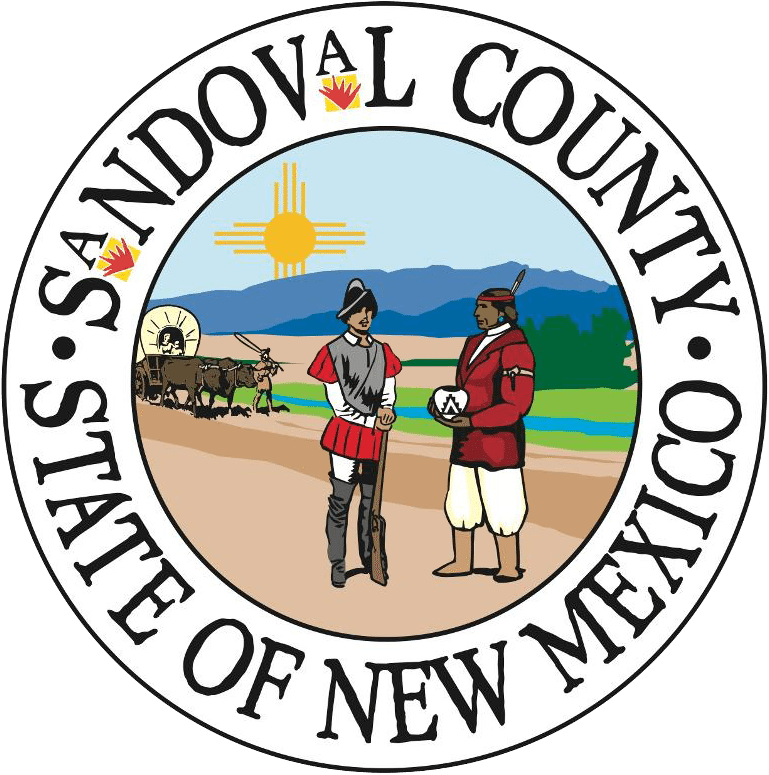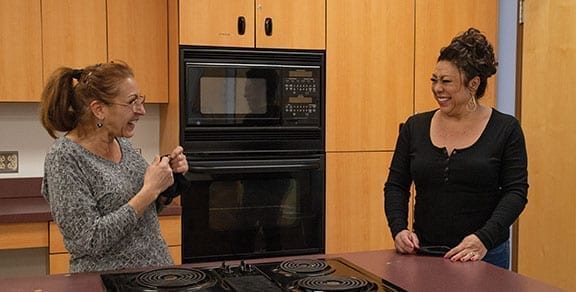By Amy Byres
Sandoval County homemakers know how to make a house a home.
According to county Frail and Elderly Program Manager Raymond Gonzales, a “homemaker” is someone who visits the frail and elderly and provides the following services:
- light housekeeping,
- laundry,
- assistance planning and preparing meals, and
- shopping for groceries and other items.
They also provide a respite service, which allows a primary caregiver an allotted amount of time to do whatever they need, while a homemaker cares for the client.
Since March, the job has changed due to the pandemic. Homemakers are not allowed to enter clients’ homes and instead make scheduled phone calls to clients, Gonzales said.
Lorella Tapia has been a homemaker for over 10 years. Pre-COVID, there was a waiting list of county residents to be a part of the program, she said.
“It is very important for this program to exist. Who knows what would have happened in the past when you had to rely on padrinos (the Spanish word for godparents) or neighbors and people like that? But now they are starting to provide these programs where they notice it really helps a lot,” Tapia said.
Before the pandemic, one of the most important services she provided to clients, who are often bed-bound, is company, she said.
“They want us to rush through our cleaning so we can sit down and visit,” she said.
Tapia would play cards with clients and check in with them, especially if they live alone.
“You’ll see milk sitting there from the last time, and they haven’t even touched it. You won’t see a dirty dish or anything in the trash and no signs that they ate. You know they don’t feel good,” Tapia said.
Homemakers will notice when clients are not taking their medication or eating. In situations like that, each homemaker has a caseworker they report to. The caseworker will update a family member or primary caretaker.
“A lot of these people are single and their closest relatives live in New York, California or wherever. While we are there, they will say, ‘We are doing great,’ but we will notice some of them are not doing so great,” Tapia said.
County homemakers call clients and do activities over the phone, assist with meal prep at senior centers and give wellness checks, Antonette Sisneros said.
“The phone calls are everything to them,” she said.
Sisneros has been a homemaker for the county over 10 years. She misses her clients but with the pandemic, not much can be done until clients and homemakers are vaccinated, Sisneros said.
When Sisneros calls her clients, she often hears, “When are you coming back? I’ll sign a paper so the county won’t be liable.”
“It is heartbreaking; it’s hard. Every week when you talk to them, it is the same thing. It’s hard for them. I know it’s been really difficult,” Sisneros said.
Sisneros has a client who is blind whom she thinks about often. Her client would misplace things around him home.
“He can’t see it, so there are times when he calls and he says ‘I’ve been smelling something in here and I can’t find it,’” she said.
For clients with no family in town, Sisneros calls the family to check if they have been able to see her clients and how things are going.
“That is the main concern, is if someone is there watching them,” Sisneros said.
Homemakers create boundaries as much as they can with clients. However, when caring for someone for years, or months at a time, it is hard not to build a friendship, she said.
Tapia feels the same way, she said.
“They call you sweetie, or hija, which means daughter. And when they feel like crying, you feel like crying. We get attached,” she said.
Tapia has one client in the hospital with COVID, she said.
“So we won’t hear from her for a while and I am worried. And then some clients get really sick and they think they have COVID and they start crying, ‘Oh, no, I think I have it,’ and I say ‘Go for a test right away,’ and if we don’t talk to them for a couple of weeks, we worry,” Tapia said.
That is when she contacts the caseworker and the program director to check on the client.
“COVID has hit everybody hard,” Sisneros said.
A difficult part of the job is when clients pass on, said Tapia and Sisneros.
“All of us have experienced clients who have passed on. We have found them hurt; we have found them on the floor, when we walked in, they have been laying there for a couple of days, or they have been gone, or they have died,” Sisneros said.
Without the Frail and Elderly Program, who knows how long clients would be in that position, Sisneros said.
“I have been there. One year, I had seven clients die; it was just the worst year, terrible year,” she said.
Tapia and Sisneros said clients touch their lives as much as they touch clients’ lives.
“I have learned so much from them. They are like your grandparents; they have been there and done that,” Sisneros said. “Just hearing their stories is great.”
Hearing stories from the past put the present into perspective, said Tapia and Sisneros.
“They teach us a lot. To be a little bit more caring, a little bit more open to how they used to live,” Tapia said.

